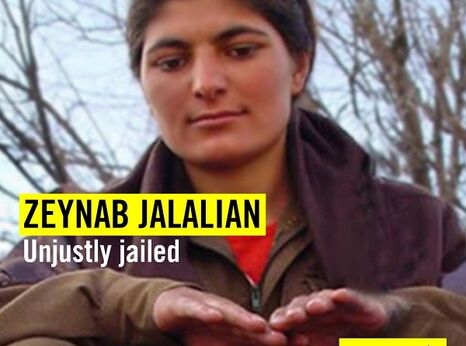Jailed Iranian Kurdish woman tortured

On 29 April 2020, Ministry of Intelligence agents took Zeynab Jalalian out of Khoy prison, West Azerbaijan province, which is located in the same province as her family home and where she had been jailed for a number of years. The following day, she was admitted to Shahr-e Rey prison in Varamin, outside of Tehran. In a phone call to her family in early June 2020, Zeynab Jalalian said she had begun to experience shortness of breath on 2 June 2020 and had subsequently tested positive for COVID-19 at the prison’s medical clinic. She has said that prison officials told her that the ministry of intelligence had barred her transfer to a hospital outside of prison. On 8 June 2020, Zeynab Jalalian was eventually transferred to a hospital outside of prison and examined for COVID-19, including with a scan of her lungs, and returned to prison. She later said that the hospital doctor again confirmed her COVID-19 diagnosis and told her scans showed cloudy spots on her lungs. The same month, interrogators from the ministry of intelligence visited Zeynab Jalalian in prison and told her that unless she makes videotaped “confessions” repenting and agrees to work with them, they will continue to deny her access to health care and keep her jailed far from her family home. On 20 June 2020, Zeynab Jalalian began a hunger strike in protest at her continued detention in Shahr-e Rey prison, asking to be transferred to Khoy prison or to Tehran’s Evin prison, and against the denial of health care. On 25 June 2020, she was transferred to Kerman prison, Kerman province, where she was subsequently held in prolonged solitary confinement for nearly three months, and denied contact with her family until 28 July 2020, when she was permitted a short phone call. During this call, which took place in the presence of interrogators, she said the interrogators instructed her speak to her family in Persian and not in Kurdish, her mother tongue. She also reported that interrogators said they transferred her to Kerman prison because she was in contact with human rights organizations abroad. On 22 September 2020, Zeynab Jalalian was suddenly transferred to Kermanshah prison, Kermanshah province. In a telephone call to her family from Kermanshah prison, she reported a continued cough, respiratory difficulties and an eye inflammation related to her eye condition. On 10 November 2020, she telephoned her family from Yazd prison, Yazd province. Zeynab Jalalian has described the transfers themselves as a type of “mental torture”; each prison transfer has meant adjusting to new prison guards, prisoners and systems. Zeynab Jalalian also added that she has not been able to take all her personal possessions with her during the transfers.
Zeynab Jalalian was arbitrarily arrested in March 2008 for her social and political activities with the political wing of the Party for Free Life of Kurdistan (PJAK), which aimed at the empowerment of women belonging to Iran’s Kurdish minority and Kurdish self-determination. PJAK is a Kurdish political opposition group, which also has an armed wing. She was sentenced to death in early 2009 on the charge of “enmity against God” (moharebeh). Branch One of the Revolutionary Court in Kermanshah Province claimed that she had “taken up arms against the state” despite the absence of any evidence linking her to the armed activities of PJAK. Noting her “alleged membership in the political wing of PJAK” and her movement between Iran and Iraq, the court reasoned that “she may have been indeed involved in terrorist operations but is refraining from telling the truth.” Zeynab Jalalian’s lawyer, whom she had only been allowed to appoint a few weeks prior to the trial, was denied the opportunity to represent her at the trial, as he was not informed of the date for which it had been scheduled. Her death sentence was upheld on appeal in May 2009 but was commuted to life imprisonment in December 2011 after she was granted clemency by Iran’s Supreme Leader. In May 2019, her lawyer Amirsalar Davoudi, was sentenced to a lengthy prison term in relation to his human rights work and Zeynab Jalalian has had no lawyer since, and her family is left to follow up on her case, including requesting her transfer for treatment to outside clinics, without legal guidance. Their ability to do so is further undermined by restrictions introduced to mitigate the spread of COVID-19 and by her transfer to different prisons far away from their residence.
In April 2016, the UN Working Group on Arbitrary Detention called on Iran to release Zeynab Jalalian immediately as she had been detained only for peacefully exercising her rights to freedoms of expression and association through “her activities as a social and political activist for the rights of Kurdish women” and “her involvement in political activism… with the non-militant wing of the PJAK”. The Working Group stated that she had been denied the right to a fair trial and that her treatment violated the prohibition of torture and other cruel, inhuman or degrading treatment or punishment. The refusal of authorities to provide prisoners with medical care constitutes torture if such deprivation is intentional and inflicts “severe pain or suffering” for such purposes as punishment, coercion or intimidation, obtaining a “confession”, or for any reason based on discrimination of any kind.